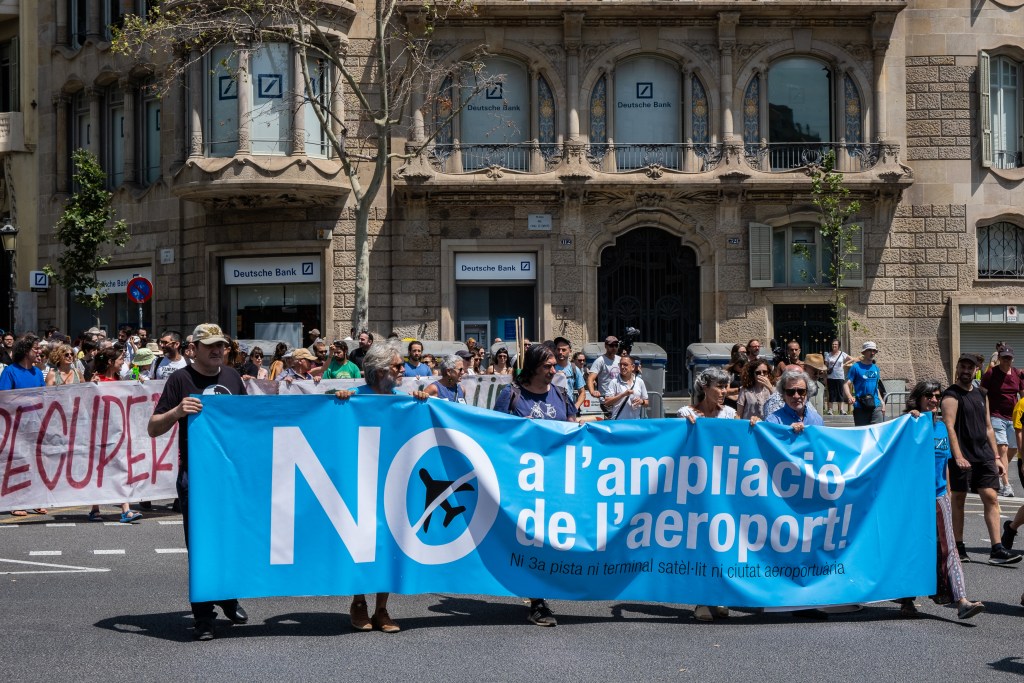
It’s official: anti-tourism sentiment is ramping up in parts of Europe.
Videos by TravelAwaits
That’s not a problem for the millions of Americans planning to spend their vacations stateside this year. With many tourists penny-pinching, it’s a great time to discover all those little gems dotting the United States.
That being said, I’d be cautious about where in Europe you visit in the coming years.
To be fair, my position is informed by where I live, which is in the heart of Barcelona’s popular Ciutat Vella neighborhood. Recently, locals made headlines again for loudly protesting tourism, even lighting a firecracker outside of a large hostel.
It’s the most well-known hub for anti-tourist protests, but the problem has spread beyond Barcelona to other parts of Europe.
And these are the parts of Europe where many Americans dream of vacationing for a week or two. They’re the parts of Europe where Americans will shell out thousands to explore museums, sample delicacies, shop boutiques, and otherwise take on some of the continent’s greatest cultural specialties.
Here’s the down-low on over-tourism protests in Europe, along with which places I wouldn’t bother visiting.
What’s going on with over-tourism protests? Is there really a problem?

The notion of over-tourism is a bit controversial. Some view it as a serious economic threat, while others see it as solid business.
On one hand, it’s not hard to see how too many tourists negatively impact a city and its locals. They crowd the streets and create a market for restaurants and shops that locals don’t use, creating an amusement-park-like feel. Tons of flights and cruises also exacerbate issues like air pollution. Worse, irresponsible companies rake in huge sums by operating illegal Airbnbs and giving low-impact day tours to cruise passengers, for example.
On the other hand, tourism accounts for a significant portion of the local GDP in many areas. In Barcelona, for example, tourism covers around 20% of the local GDP. If local people rely heavily on tourism, and tourism taxes regularly fund public initiatives, what’s the big deal?
It’s a contentious question—but let me give you an answer with two simple factoids about life in Barcelona.
First, Barcelona welcomes around 26 million tourists each year and has a population of just under two million. If the GDP-to-tourist ratio were equal, and the city only welcomed around ten million tourists a year, I doubt the debate would go on. Earnings from tourism should be proportionate to the local population’s experience of tourism.
In other words, in terms of cold, hard GDP, Barcelona only benefits from the first ten million tourists that visit. The other 16 million are the problem.
Second, the argument that tourism is good business won’t sway people in a city where quality of life is given more value than financial wealth. (Read that twice, because it’s very different from how many of us Americans view life.)
Why should you avoid areas where anti-tourism is prevalent?

Years ago, my first reaction to seeing Spanish people protest tourism was to laugh and think… that’s rich. I’m sure many indigenous groups felt the ‘tourist go home‘ sentiment when Spanish colonizers raided settlements in North America, the Caribbean, South America, Africa, South Asia, and East Asia.
I got my degree in Global Studies; I learned about the long and miserable impacts of Spain’s colonial legacy, along with other countries of Western Europe. Today, tens of millions of people still live in a world directly shaped by colonial mentality and meddling.
So, there’s plenty of fodder for discussion on both sides of the debate. And if you posited that Spain doesn’t really have the right to complain about its ‘unwelcome’ visitors, you wouldn’t be alone.
As I mentioned above, over-tourism is a complex issue—and I’d hate to paint with broad strokes about whether or not these protests are ‘legitimate’.
Instead, I’m giving you a warning. If you’re a traveler who likes to feel welcome with a few smiles, kind words, or helpful tips, then avoid these places in Europe—especially considering how much money you’ll spend on basic hotels, tours, and meals.
If you’re not bothered by a potential stand-off with water-gun-wielding locals or the anti-tourism signs hanging from balconies, then don’t let me stand in your way.
These are the places in Europe facing massive anti-tourism sentiments and over-tourism protests:
- Spain: Canary Islands, Mallorca, Ibiza, Malaga, Barcelona
- Italy: Venice, Capri, Rome, Florence, Lake Como
- Portugal: Lisbon, Porto, Algarve Coast
- Greece: Santorini
